|
|
|
Sort Order |
|
|
|
Items / Page
|
|
|
|
|
|
|
| Srl | Item |
| 1 |
ID:
177644
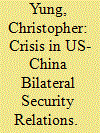

|
|
|
|
|
| Summary/Abstract |
Although the US and Chinese security relationship has been
tense for over three decades, the last three years has seen it
slide into acute crisis. The two countries are in a full-blown
security dilemma, going after each other’s “core interests,”
using their alliances and partnerships to attempt to weaken
or restrain the other, and pushing aside confidence-building measures designed to help manage the competitive
relationship. Before deriving new policy measures that can
foster habits of cooperation between the two countries, the
United States and China must create a new strategic consensus around which the bilateral security relationship can be
defined
|
|
|
|
|
|
|
|
|
|
|
|
|
|
|
|
| 2 |
ID:
122189
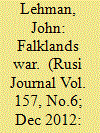

|
|
|
|
|
| Publication |
2012.
|
| Summary/Abstract |
John Lehman was US Secretary of the Navy during the Falklands War. In this personal recollection of the war's conduct he emphasises a strong and mutually supportive Anglo-American relationship at odds with the emerging historical interpretation of the alliance between the UK and the US as one fraught with difficulties and mistrust.
|
|
|
|
|
|
|
|
|
|
|
|
|
|
|
|
| 3 |
ID:
166896
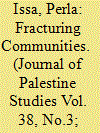

|
|
|
|
|
| Summary/Abstract |
This article examines the practices of humanitarian aid distribution from the perspective of aid recipients rather than providers through an immersion in the daily home life of Palestinian residents of Nahr al-Barid refugee camp (north Lebanon) in 2011. It argues that in the name of distributing aid fairly, humanitarian aid providers put in place a pervasive system of surveillance to monitor, evaluate, and compare residents' misery levels by relying on locally recruited aid workers. This regime of visibility was designed to be one directional; NGOs never disclosed how much aid they had available, nor when or how it would be distributed. The inclusion of local aid workers in this opaque framework turned a process that relied on community and neighborhood ties into an impersonal machine that fostered doubt and suspicion and ultimately hindered the community's ability to engage in collective political action.
|
|
|
|
|
|
|
|
|
|
|
|
|
|
|
|
| 4 |
ID:
126147
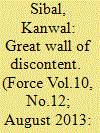

|
|
|
|
|
| Publication |
2013.
|
| Summary/Abstract |
Our relationship with China in the last decade shows features of tensions, mistrust and lack of a solution to some underlying problems coupled with efforts to build confidence, engagement and progress in some areas. In other words, the quality of the relationship has remained largely unchanged. Ties today would be probably a shade worse than they were a decade ago.
|
|
|
|
|
|
|
|
|
|
|
|
|
|
|
|
| 5 |
ID:
192898


|
|
|
|
|
| Summary/Abstract |
Since Israel’s unilateral disengagement from the Gaza Strip in 2005 and the consequent seizure of power by Hamas, there has been an ongoing military confrontation between Israel and the Islamist terror organisation. Evacuation of civilians from Israeli border localities (known as the Gaza Envelope) during such confrontations has become a bone of contention between the local residents and the government as the security situation deteriorated and the danger to residents’ lives increased. Using 30 semi-structured in-depth interviews, this article examines the home-leaving experience of Gaza Envelope residents during the May 2021 Gaza War, with reference to interviewees’ mindsets, feelings, and behaviour at the time. Findings show a crisis of trust among those who left, primarily towards the state and its institutions, and secondly towards the social solidarity that used to be a cornerstone of Israeli society.
|
|
|
|
|
|
|
|
|
|
|
|
|
|
|
|
| 6 |
ID:
117635


|
|
|
|
|
| Publication |
2012.
|
| Summary/Abstract |
Cyprus is a divided island. Despite the lack of a comprehensive peace agreement reunifying the country, in 2004 trade commenced across the Green Line that separates the Greek and Turkish Cypriot communities. The volume of trade has grown steadily since, but has it reached its full potential? First, a gravity equation is estimated by using an 'out-of-sample' estimation strategy to predict potential trade for the period from 2004 to 2009. We observe a sizable gap between potential and actual volumes of trade. We then attempt to account for this gap by analyzing economic, legal, and social-psychological barriers that can explain this difference. It is found that (1) actual trade has only reached around 10% of its potential, with (2) legal constraints accounting for 35% of the missing trade, (3) extra transportation costs for about 5%, and (4) unmeasurable and social-psychological barriers for a significant amount of between 48% and 60%, depending on the year. The findings suggest that attention must be paid to the objective barriers to trade as well as the subjective interpersonal and intercommunal perceptions that can affect trade and ultimately, peaceful resolution of the conflict. These findings have implications for other conflicts in which divided communities with the potential for trading across a shared border seek to maximize the joint economic and political gains of emerging interdependence.
|
|
|
|
|
|
|
|
|
|
|
|
|
|
|
|
| 7 |
ID:
189500
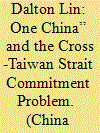

|
|
|
|
|
| Summary/Abstract |
Fifty years after the current “one China” framework emerged in international politics, the cross-Taiwan Strait “one China” dispute has transformed from its historical nature of indivisible sovereignty. As Taipei has stopped competing internationally to represent “China” since 1991, Beijing now worries that compromising its “one-China principle” in cross-Strait reconciliation would enhance Taiwan's separate statehood internationally and enable the island to push towards de jure independence. In contrast, Taipei worries that any perceived concessions on the question of “one China” would enhance China's sovereignty claim over Taiwan and enable Beijing to push for unification coercively with fewer concerns about international backlash. Improved cross-Strait relations thus rely on circumventing this quintessential commitment problem in international politics.
|
|
|
|
|
|
|
|
|
|
|
|
|
|
|
|
| 8 |
ID:
105213
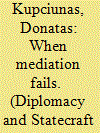

|
|
|
|
|
| Publication |
2011.
|
| Summary/Abstract |
This article examines British involvement in solving the Vilnius dispute in 1920-1923, where Britain was caught between its desire to maintain Allied solidarity with the French and its own foreign policy prescriptions. In the context of the complexities of the relationship between the two Allied Powers that often took a "friend-but-foe" form, tension between the two goals conditioned the ultimate fiasco of British dispute mediation initiatives. Britain's desire to act entirely in accordance with France led the former to renounce many feasible dispute settlement initiatives, including the possibility of forestalling conflict, whilst the lack of similar devotion to Allied solidarity on the French side and the atmosphere of mistrust between the two Allied Powers undermined the British initiatives for which it was prepared to stand.
|
|
|
|
|
|
|
|
|
|
|
|
|
|
|
|
|
|
|
|
|